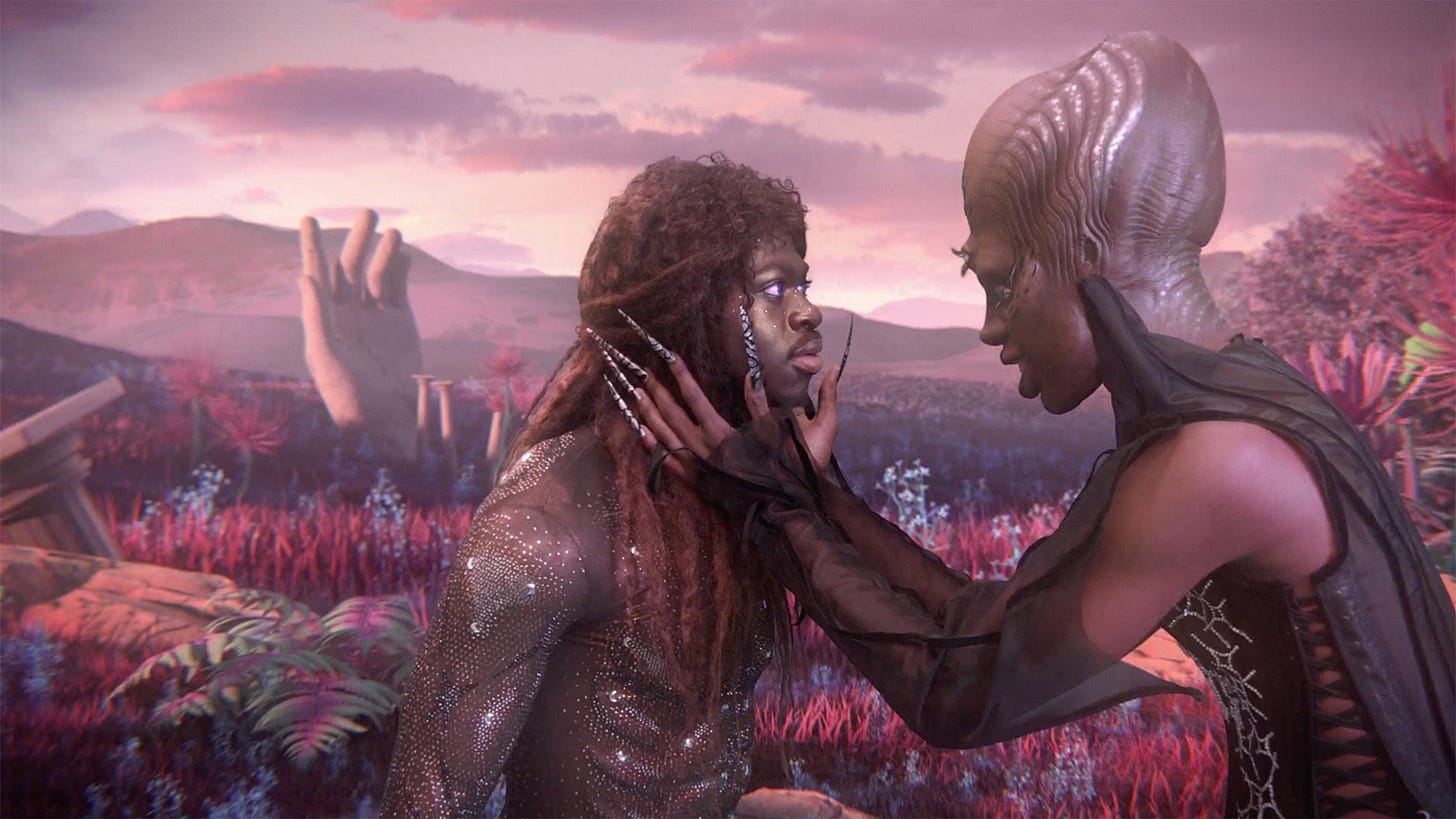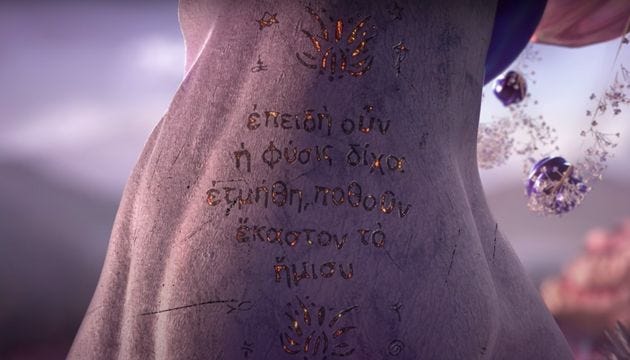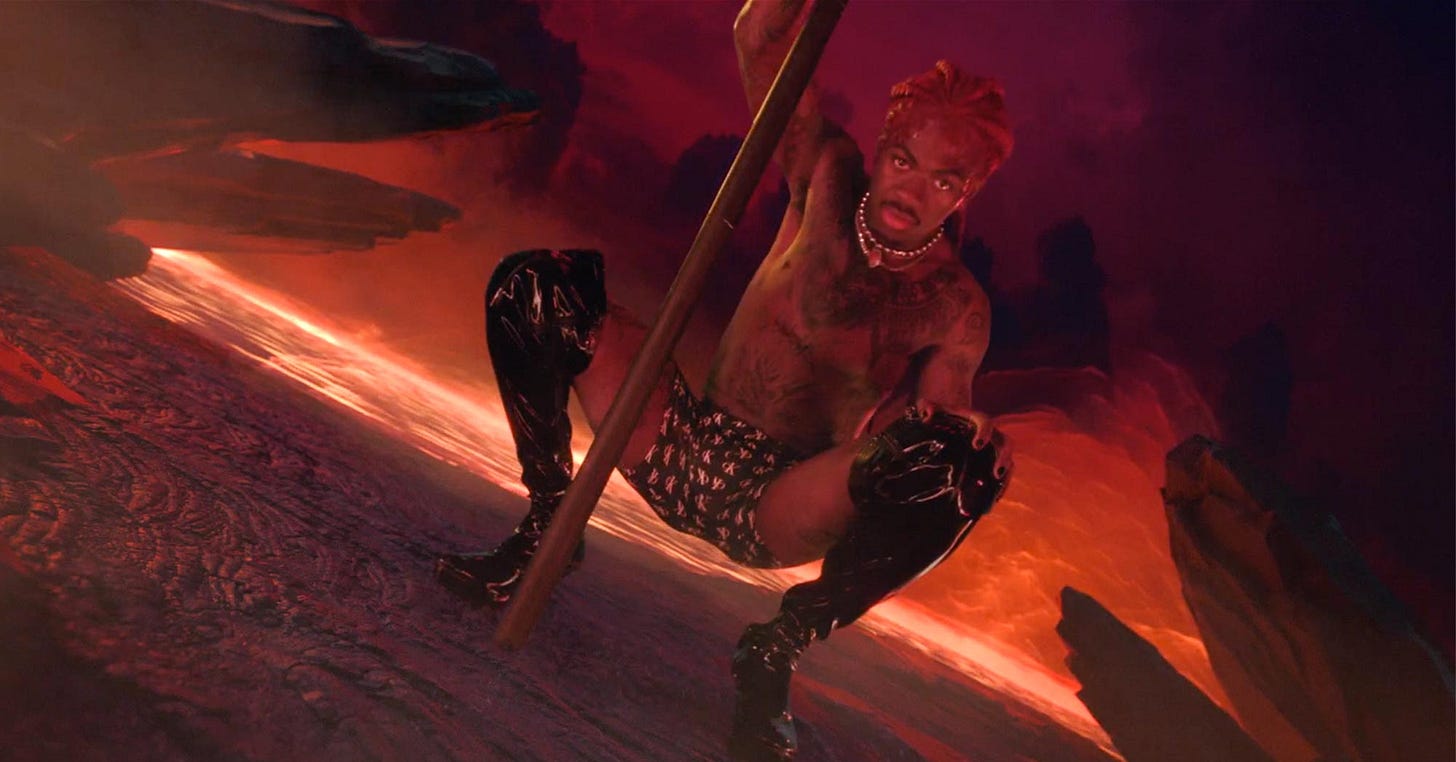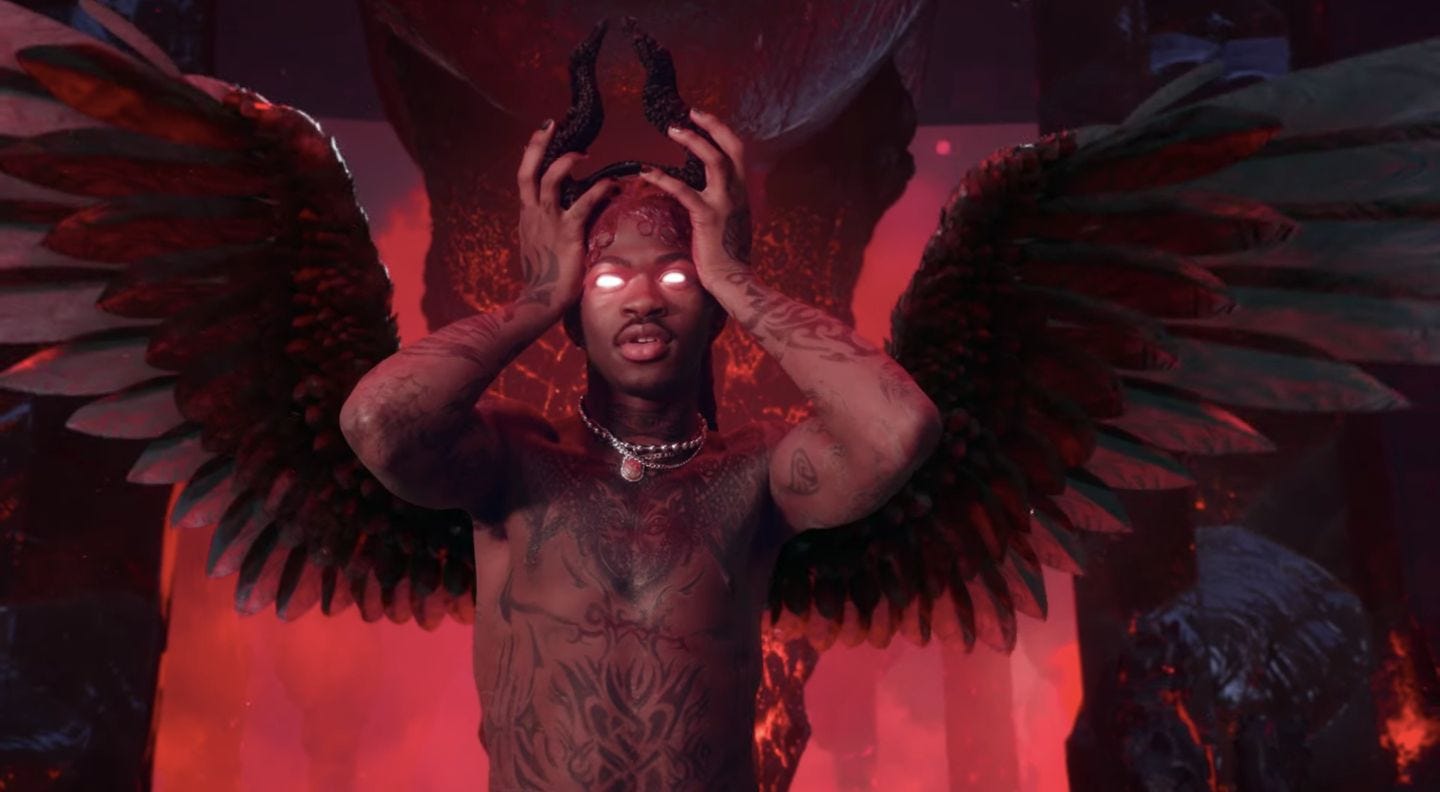How Lil Nas X Challenges the Catholic Imagination
The video for "Call Me By Your Name" is theologically brilliant—Satan and all.

Today’s newsletter is all about the new music video for “Montero (Call Me By Your Name)” by Lil Nas X, which I have officially watched more times than I did when Lady Gaga’s “Bad Romance” dropped. (In homosexual terms, this is a milestone.) In case you haven’t seen the video (which now has over 22 million views), it’s complete with religious and mythological imagery—Lil Nas X starts by being seduced by the snake in the Garden of Eden before being publicly humiliated (and executed?), then upon his ascension to heaven, he grabs an eternal stripper pole and dances his way down to Hell, where he sits on Satan’s lap.
The video has, naturally, stirred a controversy among religious conservatives on Twitter—all of which Lil Nas X has either shot back at or laughed off completely. But I do think there’s a space to talk about the significance of the religious metaphors in the video and what kind of commentary they offer about the Creation Story, Original Sin, and Heaven versus Hell.
That’s why I called up my pal Olga M. Segura, the author of Birth of a Movement: Black Lives Matter and the Catholic Church, and the opinion and culture editor for the National Catholic Reporter. Olga and I do a scene-by-scene breakdown of the video below, and talk more about the failure of the Catholic imagination, the harmful side effects of purity culture, what we can all learn from embracing our demons, and why we need more religious art in music videos.
PP: So obviously, I have a different circle than you do on Twitter, so I'm seeing nothing but glory and praise for Lil Nas X and his bravery in releasing this video. What is your community saying?
OS: My community is also very similar, everyone is really praising the video, especially Black and brown Catholics who have been very disillusioned with the latest Vatican nonsense about not wanting to bless same-sex unions. So a lot of people are like, ‘This feels so cathartic. It feels like someone is queering theology in the right ways.’
But of course, I've gone looking for those very conservative voices who are like, ‘How dare he do this? How dare he take religious text and use it in this way?’ And I'm like, ‘What happened to the Catholic imagination? I thought this was exactly what we do.’
PP: Lil Nas X is also engaging with some of those voices on Twitter. He was like, ‘Well, you guys are making jokes about us going to hell all the time, and now you're mad that I went there?’
I know that the video was intentionally rooted in religion and how religion is wielded against LGBTQ+ people, but of course, if you're watching this video, you could say that religion is wielded against anyone whose sexuality deviates from what the Catholic or Christian path has said is righteous.
For example, we start in the Garden of Eden. This is a place of freedom, and we enter with Lil Nas X almost as an Eve figure.
OS: I saw that and I thought it was a wonderful way to start, to just place himself within the foundational text for so many Christians. Because how many times have you heard a problematic Christian say, "It was Adam and Eve, not Adam and Steve, not Eve and Lisa!” This is one of the foundational texts that Christian bigots love to use.
For the first time this year, I’m making my way through Genesis. Every time I read it, I think, "The Bible is so boring because it's so white and it's so male." So, seeing Lil Nas X completely reimagine it and think, "No, no, no, this is what it's going to look like. It's going to be really Black. It's going to be really queer, and it's going to be really beautiful,’ I loved that.
PP: And isn't it so interesting that he placed himself as the Eve figure, rather than Adam? The Genesis story tends to malign women's sexuality in a way that is used as a precedent to make women submit, or feel ashamed of their bodies, and that men need to lead the way, because women made that original sin.
When I think about a gay man or any queer person, really, placing themselves as that Eve figure, I think there’s a layered commentary of how all of our sexualities are deviant under this system. Like, I'm placing myself in Eve's shoes because we together have been demonized by this religion.
OS: Especially trying to be a young person in the Catholic church, or maybe any Christian Church at this moment, you feel as though you have no place to talk about sexuality—especially to talk about a sexuality that looks very different from what the Bible says it should be. Every time I read about Adam and Eve, I'm always looking at Eve as a badass woman who was like, ‘Why can't we have this knowledge? Why shouldn't we give into the curiosity?’ I always read it more as the snake being this curious entity that's showing us, ‘Hey, you have dark sides inside of you, and why should you run away from that?’
PP: It's so funny you say that too, because in some Christian art, the snake is not just the devil, but the snake is Lilith. In some texts, Lilith represents the temptress, or the dark side of female sexuality. Some readings actually say that men’s nocturnal ejaculation or ‘wet dreams’ are a sign that they’ve been visited by Lilith in the night. In a more contemporary reading, we could say that when patriarchal religion came, Lilith was banished to hell because male-dominated religions were fearful of women in power and, therefore, what Lilith represented. I thought more about Lilith when I saw Lil Nas X dancing with the Devil, because she’s more popularly known as the Bride of Satan in contemporary culture. That's what this Lilith figure was supposed to represent—there’s a darkness to us, and that we have a duality. But Christianity teaches us to hide and suppress our demons, whereas other religions in the world would actually encourage us to face our demons and understand them.
OS: Speaking very specifically from a Catholic background, this is a faith that is so fascinated with talking about suffering and desolation, and yet so unwilling to talk about things like our duality or sexuality. As people raised in this tradition, we should embrace those things and we should talk about them more fully, because we immerse ourselves in a purity culture that is so devastating for queer individuals and women in this church.
PP: Yes! And then, before Lil Nas X leaves the garden, there's an image of a tree with glowing letters. So I actually looked up what they say, and it's a quote from The Symposium by Plato. There are a lot of classical Greek or Roman mythological visuals throughout, actually. But that plate on the tree reads, "After the division, the two parts of man, each desiring his other half."
So this is interesting, because there's a double entendre here that's really clever, on the one hand, ‘Desiring his other half,’ means soulmates. That easily can be gay love. Creation split us in half and so some of us have soulmates who are same sex, and some of us don't.
But in the Greek mythology creation story, the initial mortals started off as being of both sexes at once. There are different interpretations of the story, of course, but the one that stuck with me is that the gods were threatened by these mortals because they were too powerful. So, Zeus sent the thunderbolt down to separate the mortals into two—by dividing their genders, he removed their power. So there was, male-male, male-female, female-female, right? Zeus separated them so that everyone would have to go find their soulmate, but in the classical retelling of the story, you can easily find a way for homosexuality to have existed in harmony in this world.
OS: It's wonderful to hear that, because you know that Lil Nas X is also thinking about that duality throughout this entire video. What I love about these Easter eggs is that it seems like he knows the exact arguments that people are going to form against him. And he's like, ‘Wait, wait, wait, look at this history that has existed. It's not just the Bible, there's also this Classical element to it.’
PP: Okay, so in the next scene, we see Lil Nas X in this sort of Colosseum—again, drawing on classical imagery, and he's in the middle. There are folks around him in blue, who are judging him or castigating him, and then he is all in pink, and then one of the audience members throws a butt plug at him.
OS: Oh my God, I didn't realize that’s what they threw at him?
PP: It's a metal butt plug, honey. And so, it hits him in the head—which, ouch—and then he dies. What were you interpreting this scene as being about?
OS: I felt like this moment is representing his internal struggles. On top of dealing with all of the homophobia of the society around him, including the hip-hop community that he finds himself in as well, he's also dealing with his own identity. Think about all of the people in blue—Lil Nas X is playing all of these people who are also judging Lil Nas X in the pink attire.
I read this part as, ‘Okay, I'm dealing with all these societal issues and society has to change, but I also have to change. I also have to accept who I am.’ This really touches back to how he talks about trying to come to terms with his homosexuality as a teenager, and praying that it was just a phase and that it would all go away.
PP: When you pointed out that the judgmental people in blue were all portrayed by Lil Nas X, I hadn't thought of that. After reading the statement he released about how he once thought that he could be the ‘right kind’ of gay man, it makes me think that maybe the spectators in the Colosseum were society, but the inner circle of folks dressed in blue imprisoning him was his own masculine self. So we see him punishing this beautiful pink self that's there in the middle, trying to get free.
OS: Right—it’s also the whole masculine identity fighting society's idea of what it means to be masculine, what it means to be feminine. And the fact that he picked these colors that we tend to associate with masculinity and femininity, he's again subverting this in so, so many ways.
PP: And I love that it was death by butt plug. Relatable! So after he gets knocked out by the butt plug, we see him ascending into the heavens, and there's an angel figure that's there, that's right in his grasp. But then the pole comes up, and he grabs it, and his whole look changes, and then he's in these red braids with the Calvin Klein undies and the thigh highs, and he’s pole dancing down into hell. What does the Bible tell us about this kind of ascension into heaven, and who would meet us in heaven?
OS: That was interesting because the Bible and the Catholic faith teaches us that at that moment when you die and you're ascending into heaven, this is what we're supposed to strive for. We're supposed to want to be in heaven with God and with Jesus Christ, because this is where we will be free of all of the evils of Earth. But I've always been fascinated by the snake, and by Lucifer. In college, I was obsessed with this idea of Lucifer as a character that we could sympathize with and try to understand. So when I saw Lil Nas X reject this ascension and decide to strip his way down into hell, I read that as, ‘Okay, I could go up to heaven. I could give into this ascension to this very white understanding of what heaven should be, but no, no, no, no, I'd rather stay here a little longer and continue to descend into that dark place.’ We talked earlier about that duality, and he says, ‘You know what? I'm not done here yet. I have to explore this other side of me.’
PP: There's something about the gates of heaven and being met by an archangel who issues our judgement. The parallels being, of course, that Lucifer was the fallen angel who was banished to hell. And so, there's a choice being made between this superconscious angel up here, and then the devil or id below. I also was wondering too: if you have this choice, can you actually ascend to heaven if you're not right with yourself? If you haven't actually relinquished your demons, and you haven't faced them and conquered what you need to, is heaven even for you?
When he gets down into the gates of hell, we obviously see the pentagram on the floor, and the devil is seated on his throne, and then there's words on the floor that read, ‘They condemn what they don't understand.’
It's clear—especially with the lap dance with the devil—that this is all about you leaning into what they condemned. This is about you facing what you thought were your demons. And this is something that, as a gay ex-Catholic, I deeply relate to. Even after I came out of the closet, it was years before I would be anything close to sexually active with a man, because I was still so loathsome of myself. And I thought that there were parts of me that were the Devil speaking. That's what I was taught.
So it did feel like even engaging in relationships with guys, going on dates with guys, kissing boys, doing other things with boys, it all felt like it was an embrace of the devil, and there was always a voice in the back of your head where it's like, ‘Is this the dark side?’ And then of course, you start to realize, ‘No, there's love here, if you want there to be love here.’ And then, later: Even if there's not love here, sexuality doesn't have to be what a bunch of celibate, old, hating ass white men said it should be! So if you need to identify your own rules about what feels good sexually and spiritually, and if you need to harness your own demons in the way that works for you to be a happy and fulfilled person, then go give that proverbial or literal lap dance, honey.
OS: Yes! Especially those of us who grew up Catholic, we are fed this very sanitized idea of what sexuality should be, and it ultimately creates shame. I remember when I was first exploring my sexuality in my 20s, there was so much guilt attached to it, and it's because no one taught me all of the things that you and I have been sharing. That this could be love, or this could just be intimacy that you share with another human being, and even that is a part of finding yourself! You talked about how you can't ascend into heaven until you are right with yourself, and I think that that's what faith ultimately is.
If we're viewing Satan as this symbol of complete evil, who’s responsible for every ugly thing that happens, I love that the video ends with Lil Nas X snapping his neck. He very clearly establishes himself as being like, ‘I can abolish evil, because I am not the evil that you guys claim to be. I am someone who is worthy and beautiful, and full of love, and I will embrace this dark side here, but I will ultimately ascend.’
PP: When I watched that, I read it as him slaying the demon—but then when he assumed the horns, I was amused. Again, in Christianity, it's all about avoiding the demon, fearing the demon, suppressing the demon, which results in all sorts of evils manifested in the world and in these institutions.
But he killed the devil, and then he wears his crown. So you conquered your demon, but when you did so, you took a piece of that demon with you. Do you know what I mean? This isn't about you now ascending back and being heaven's little perfect angel boy, this is about you showing up as your full self. We are all the demons and the angels we walk with. There's always that multiplicity that exists in people. It's not even just a duality, it's many layers.
OS: There's so many different parts of who we are. And yes, he can slay those demons, but he's going to forever carry that suffering with him—and that informs his work, his art, and his music.
PP: I feel that, I do. And again, this descent into Hell is not very Christian—it feels more like mythology. There are different stories in The Odyssey or The Aeneid where our protagonists have to descend into hell in order to become the hero. And really, these stories are all excellent metaphors for the fact that there is no way you can be a hero worthy of uplifting and memorializing until you've faced the worst of yourself. And sometimes that means facing death, sometimes that means facing the antagonistic elements that are inside of you, but that underworld journey is something that you cannot ignore if you are a truly spiritually fulfilled person. You have to go to the underworld—and then, come back.
OS: I think that's what makes it even more powerful. That young kids who are struggling the way he was not so long ago are going to see this video and say, ‘I am loved, and I am okay. But I don't have to run from the suffering. I can figure out how to talk about it.’ That’s why Lil Nas X is such an important figure, especially for Black and brown people who are really struggling with that identity.
PP: Oh, for sure. I mean, even to have a musician in this world who says declaratively, ‘Please stop saying that I'm a palatable version of a gay man. I'm not, I'm queer as fuck, and I'm so proud of it. I want other people to be included here.’ So many gay men are walking around this world, myself included, with internalized homophobia, and a fear of the feminine, or a fear of embracing our fullest selves, which has all sorts of retaliatory effects on how we treat one another, or how we try to assimilate into this world to be more successful, or how we try to masculinize ourselves in order to be more attractive.
It's been liberating to watch him deal with this stuff in real time in a really strong and focused way, because it would've been very easy for him to say nothing and just not do the Call Me By Your Name video in this audacious of a way that was going to get the whole internet talking, but yeah, he chose to get people talking.
OS: Yeah, he really, really did. I was watching it one more time before the conversation, I was like, ‘Wow, 12 million views in less than a day. People are absolutely talking about this,’ and they should be. It’s also important to have artists show that you can have a queer Black man or woman use religious iconography in this way. This is how we should be talking about what it means to interpret scripture. This is more moving than half of the things I've seen in museums all across the world that have been executed by white men, and glorified as the so-called greatest depiction of religious art.










YES! I was hoping you'd write about this.
So fabulous...love the video and appreciate the conversation here. Right on point!